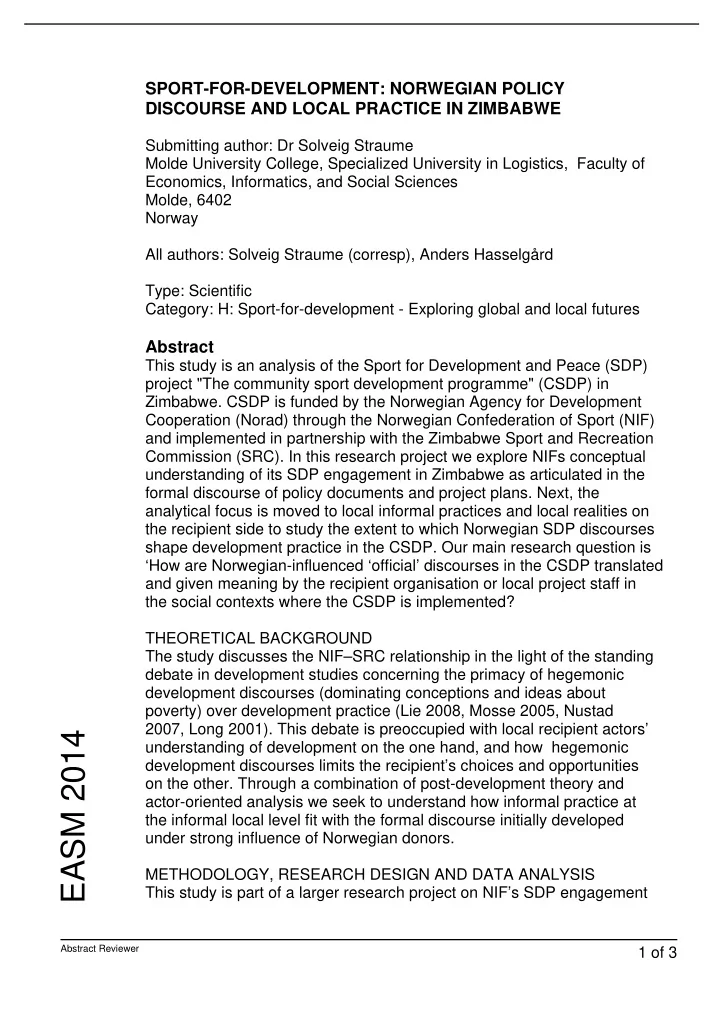

SPORT-FOR-DEVELOPMENT: NORWEGIAN POLICY DISCOURSE AND LOCAL PRACTICE IN ZIMBABWE Submitting author: Dr Solveig Straume Molde University College, Specialized University in Logistics, Faculty of Economics, Informatics, and Social Sciences Molde, 6402 Norway All authors: Solveig Straume (corresp), Anders Hasselgård Type: Scientific Category: H: Sport-for-development - Exploring global and local futures Abstract This study is an analysis of the Sport for Development and Peace (SDP) project "The community sport development programme" (CSDP) in Zimbabwe. CSDP is funded by the Norwegian Agency for Development Cooperation (Norad) through the Norwegian Confederation of Sport (NIF) and implemented in partnership with the Zimbabwe Sport and Recreation Commission (SRC). In this research project we explore NIFs conceptual understanding of its SDP engagement in Zimbabwe as articulated in the formal discourse of policy documents and project plans. Next, the analytical focus is moved to local informal practices and local realities on the recipient side to study the extent to which Norwegian SDP discourses shape development practice in the CSDP. Our main research question is ‘How are Norwegian-influenced ‘official’ discourses in the CSDP translated and given meaning by the recipient organisation or local project staff in the social contexts where the CSDP is implemented?� � THEORETICAL BACKGROUND � The study discusses the NIF–SRC relationship in the light of the standing debate in development studies concerning the primacy of hegemonic development discourses (dominating conceptions and ideas about poverty) over development practice (Lie 2008, Mosse 2005, Nustad 2007, Long 2001). This debate is preoccupied with local recipient actors’ EASM 2014 understanding of development on the one hand, and how hegemonic development discourses limits the recipient’s choices and opportunities on the other. Through a combination of post-development theory and actor-oriented analysis we seek to understand how informal practice at the informal local level fit with the formal discourse initially developed under strong influence of Norwegian donors.� � METHODOLOGY, RESEARCH DESIGN AND DATA ANALYSIS� This study is part of a larger research project on NIF’s SDP engagement Abstract Reviewer 1 of 3
in Southern Africa, and particularly the relationship with its partner organisation, SRC. Triangulation of different qualitative research methods was necessary as the main focus of our research was on the transition from project design to practical implementation in different local contexts. To conduct this research we applied a combination of archive and documentary research (public archives at NIF, the Norad and the Norwegian Embassy in Harare), interviews (NIF and SRC representatives, local project staff, Norwegian sport volunteers) and field observations in Zimbabwe (attending formal meetings, visiting locations where sport activities were carried). Also, informal conversations with a variety of people involved at different levels on the Zimbabwean side during our field work gave us valuable information and insights on how the CSDP works in practice.� � RESULTS, DISCUSSION AND IMPLICATIONS� The study shows that Norwegian SDP values, concepts and ideas are reproduced and manifested in the CSDP’s formal discourse. However, our findings show that the “Norwegian” SDP discourses are modified when the focus shifts from the formal discursive level to the practical implementation level. The study demonstrate that on a local level the project implemented does not always fit the Norwegian conceptual ideas of SDP found in policy documents and project plans. Local project staff does not necessarily uncritically accept the imposed formal SDP discourse, but are able to translate and adapt the project to fit with local contexts and needs. Thus they exercise local agency through a process of transformation and contextualization. This does not mean that local project staff do not relate to policy documents and project plans. In fact they relate to them and also work actively to sustain them through project reports to NIF because it is in their interest to secure further project funding from their donors. This reveals the complex social life and agency of actors within this project and how different worldviews are negotiated. From our results, and in line with Lindsey and Grattan (2012), we call for better understanding of the development process seen from the perspectives of actors in the Global South that can help us unveil the multiple realities determining how SDP is experienced among different actors and people’s conflicting interests and intentions which affect the way that SDP projects are implemented in practice. EASM 2014 References Lie, J.H.S., 2008. Post-development theory and the discourse-agency conundrum. Social Analysis, 52 (3), 118–37.� � Lindsey, I. and Grattan, A., 2012. An ‘international movement’? Decentring sport-for-development within Zambian communities. International Journal of Sport Policy and Politics, 4 (1), 91–110.� � Long, N., 2001. Development sociology: actor perspectives. London: Abstract Reviewer 2 of 3
Routledge.� � Mosse, D., 2005. Cultivating development: an ethnography of aid policy and practice. London: Pluto Press.� � Nustad, K., 2007. Development: The devil we know?. In: A. Ziai, ed. Exploring post-development: Theory and practice, problems and perspectives. London: Routledge, 35–46. EASM 2014 Abstract Reviewer 3 of 3
Recommend
More recommend